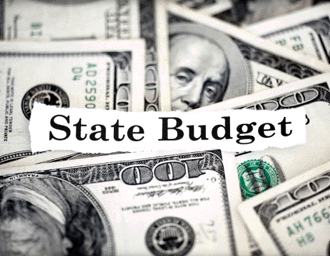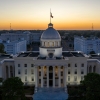By Brandon Moseley
Alabama Political Reporter
State General Fund agencies want more money than the General Fund is likely to have in tax receipts. By most accounts, the State needs $261 million to cover the needs of the various agencies and departments in the troubled Alabama General Fund.
Most of this shortfall dates back to the 2012 legislative session. Instead of raising taxes or cutting the budget then, the legislature went to the taxpayers and asked to raid $400 million from the Alabama Trust Fund to cover expenses through the 2014 elections. The voters agreed, almost everybody was reelected including Alabama Governor Robert Bentley (R) who ran on a no new taxes pledge in 2014.
With time running out in the 2015 legislative session, it is anybody’s guess how the legislature will handle this.
There are a number of plans being discussed.
The first plan was proposed by Governor Bentley. Bentley asked for the legislature to raise taxes without a vote of the people. Bentley proposed raising taxes on car sales, rental cars, banks, public utilities, cigarettes, tobacco, etc. The Bentley plan was introduced with much fanfare but has failed to get much support in the legislature or with the people of Alabama. State Auditor Jim Zeigler (R), Attorney General Luther Strange (R), and Public Service Commission President Twinkle Andress Cavanaugh (R) have all come out in opposition to the massive tax increases and the plan has been roundly condemned on talk radio stations across the State.
GOP lawmakers were given four more years by their voters promising not to raise taxes. Just six months later, few seem eager to tell voters that they lied and new taxes really were necessary. The Bentley plan or some parts of it could still pass, but a lot of people are going to have to change their positions in the next few days.
The next plan was proposed by the House Finance and Taxation Committee. The GOP lawmakers have drawn up a leaner meaner general fund budget. The GOP plan would mean cuts to virtually every State agency. The $260 million in cuts would be exacerbated by cuts in federal matching funds. Bentley has roundly criticized the plan saying that it would result in the release of prisoners, less state troopers on the roads, hurt criminal investigations, closing of state parks, slower prosecutions, poorer functioning courts, hurt poor seniors in nursing homes, and cut programs for children.
Many conservatives scoff at this gloom and doom scenario and say that there are options to sensibly downsize a bloated state government.
The Alabama Policy Institute’s Katherine Robinson and Caleb Crosby wrote recently, “API has proposed or supported a number of ideas that, if implemented, would help fill the budget gap. We’ve researched and recommended various cost-saving reforms to our public pensions, Medicaid prescription reform, eliminating vacant positions within state government, privatizing ABC and bidding out various nonessential government services, exploring tax amnesty to generate revenue already owed to the state, and bringing health insurance premiums of state employees more in balance with those of private sector workers. Some of these ideas are making their way through the legislature and some are not.”
Senate President Del Marsh (R from Anniston) is promoting a plan where the state generates revenues by expanding gambling in the State. The Marsh plan (which borrowed a lot from an earlier House Democrats plan) would create a State lottery and make a compact with the Poarch Creek Indians (PCI) dropping the State’s objections to PCI’s operations which violates current state law; but is protected by the US Bureau of Indian Affairs. PCI would pay taxes to the State. The Marsh plan would also extend gaming rights given to the Indians to Victoryland, Greene Track, the Mobile Dog Track, and the Birmingham Race Course. Voters would have to approve the lottery and likely the casino gambling expansion. The Birmingham Race Course is promising to bring horse racing back to Alabama if the plan is approved.
Polls show that voters support a lottery; but most of the voters support an education lottery, like Georgia’s Hope Scholarships that sends kids to school. This lottery would go straight to the State’s troubled general fund and would not give kids any money for schools and would have no direct effect on schools. That has the potential to be a much harder sell.
A fourth plan being promoted by Speaker of the House Mike Hubbard (R-Auburn) is simply a compact with the Indians alone. Under the terms of the compact that Speaker Hubbard negotiated with PCI would preserve the Indians monopoly on gaming. The State would get taxes on the future gaming. PCI has promised to pay the state $250 million the first year to address the 2016 General Fund shortfall, plus future revenues.
Legal analysts have advised the Alabama Political Reporter that the Indian gaming plan, like the Marsh plan, would also require an expensive referendum if they want to expand the gaming at the site to include table games and/or slot machines.
Critics of the Indian plan are critical of PCI having a monopoly and Birmingham supporters are critical because all of the money goes to Montgomery and South Alabama. The Marsh plan would make Birmingham a destination city for gamblers from Atlanta and Nashville. The PCI plan simply formally legalizes gaming facilities that are already operating. Proponents of the Marsh plan say their plan would generate thousands of new jobs.
Gambling critics argue that the state shouldn’t balance its budget by encouraging people’s gambling addictions.
Governor Bentley said that the Marsh bill, “Makes Alabama look like Las Vegas. It is one of the worst bills I have ever seen.”
Robinson and Crosby wrote, “The success of lotteries and gambling, of course, depends upon the participation of the poor and vulnerable. The State then becomes addicted to these funding streams and politicians actually desire for more and more individuals and families to recklessly spend their money this way. Calls to further expand gambling will become incessant and government will be expanded right along with it. Simultaneously, Alabama’s leaders will become owned by these entities whose power and influence is made possible through money lost by our own State’s gamblers.”





















































